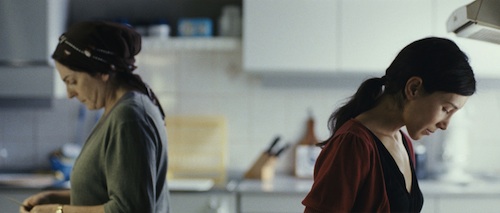Can Short Fiction Help Fight Against Honor Crimes?
 Can Short Fiction Help Fight Against Honor Crimes? Ali Nihat Eken
Can Short Fiction Help Fight Against Honor Crimes? Ali Nihat Eken
Photo credit: When We Leave (2010) "Die Fremde" A film directed by Feo Aladağ
Oppressive patriarchal order, gender discriminatory customs, clashes between traditions and modern life styles as a consequence of rapid urbanization, and insufficent current laws all seem to be contributing to violence against women and girls.
It is dramatically terrifying that in many regions of the world a lot of women and girls still lose their lives as a result of honor crimes. Turkey is, unfortunately, one of these countries where some women can be subject to this form of violence.
A report by UNICEF Turkey indicates that women and girls are killed by their own family members who “perceive any relations with men other than immediate relatives as a source of disobedience or disgrace requiring retribitution.” According to Kuraner (2002), “the decision to kill the disobedient girl is taken by the so-called family assembly [and] the task is usually relegated to a minor male member of the family as he can benefit from the circumstances of underage” (p. 28).
And all this is done by the perpetrators in the name of preserving or cleaning the family honor at the expense of women’s lives.
As an instructor who believe in the value of using literary texts in the classroom, I would like to propose that we can use short fiction as a means of raising consciousness about the seriousness of honor crimes. Any good short story exploring the theme of honor crimes may have the potential of triggering a fruitful debate on the issue.
Here, in this essay, for practical reasons, I would like to share my views by referring to “Resho Agha”, a short story by Turkish author Bekir Yildiz. The English version of the story translated by Thomas F. Brosnahan can be found in “An Anthology of Modern Turkish Short Stories”, a book edited by Fahir İz and published by Bibliotheca Islamica in 1990. “Resho Agha” is about a rich and powerful man’s victimization of his own daughter to preserve his family honor.
What can we do with this short story? Many things! Let me share this list of ideas with you. I believe through this short story we can examine and discuss:
How men and women are positioned in the narrative: Even a careful analysis of the first paragraph of “Resho Agha” can demonstrate the place of men and women in patriarchal order. In addition, an analysis of how much talk is done by men and women, and in what manner, can also be an effective way of examining an all-powerful patriarchal order.
How “honor” is perceived: An examination or discussion of the concept of honor can show family honor is predominantly aligned with male honor. An examination of this concept may reveal how phallocentric order can ignore female subjectivity. It may also demonstrate how economic and legal structures and the interpretation of religion can have some impact on how honor is viewed in the society.
How women are turned into objects of male desire: In the earlier part of the story, Agha’s daughter becomes the object of desire for the groom and this opens the way for her destruction.
How objects are aligned with masculinity: An examination of the story will reveal that some objects (for example, guns) are associated with masculinity. Examining the gender codes in these objects can lead to fruitful discussions.
How customs are accepted as given facts of life: The victimization of the daughter is the most dramatic part of the story. It shows how helpless and reluctant the community can be in changing customs or traditions.
What can be done to stop honor crimes: Following the deconstruction of the story, any discussion of what can be done to stop honor crimes will give learners a context where they can apply “fiction” into reality. Their suggestions may help them realize that they have both responsibilities and power as individuals as far as “what needs to be done to fight against honor crime” is concerned.
What we can do with a short story depends on what we want to do with and where we want to use it. What I have suggested in this post is just a few of the things that can be done with a story.
I am not claiming that honor crimes can be stopped through the use of short stories and any other forms of literature. What I simply want to say is that through an exploration of a short story, we can encourage learners to think about a problem on which they may have never spent quality time.
Sources:
Honor Crimes and Forced Suicides, an article by UNICEF Turkey, Protective Environment for Children
Celebrations of Love: Women Denounce Honor Killings in Turkey, an article by Efsa Kuraner in Off Our Backs, March-April 2002.
